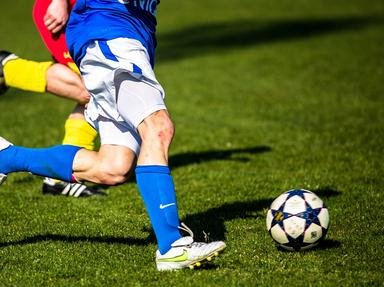Quiz Answer Key and Fun Facts
1. Goalkeeper.
Gordon Banks was a vital part of the England 1966 World Cup winning team and kept a clean sheet until the semi-final against Portugal. Who scored that goal, breaking Banks's clean sheet?
2. Right Back.
When French international Lilian Thuram retired from professional football, he was France's most-capped player after 142 appearances. He played in France, Italy and Spain during his admirable career. Which club was the last he played for on his retirement in 2008?
3. Centre Back.
Italian Paolo Maldini followed in his father's footsteps and became a world-class defender at both national and club levels. Paolo spent his entire playing career at just one club. Which club was it?
4. Centre Back.
When England stalwart Bobby Moore retired from International football in 1973, he held the record of most-capped player (108 caps). That record was broken In 1989. Who broke Bobby Moore's record?
5. Left Back.
Just after a World Cup 2002 qualifier, Brazilian international Roberto Carlos was allegedly spat on by José Luis Chilavert. What country was Chilavert representing that day?
6. Right Winger.
English international Sir Stanley Matthews, born in Stoke-on-Trent in 1915, only ever played for two professional clubs. Which club did he spend most time with, albeit interrupted by a very successful stint at the other?
7. Midfielder.
As both a player and as a manager, Spaniard Josep Guardiola has clocked up a shed load of titles. Which of the following titles did he not manage to grasp as a player?
8. Left Winger/playmaker.
Manchester United star Ryan Giggs has never played for the senior England national team despite being born in the UK. Why has he never been capped for the senior England team?
9. Attacking Midfielder/Striker.
Although Ruud Gullit could play pretty much anywhere on the pitch, he was playing as striker when he helped his national team, The Netherlands, win one major tournament. He scored his only goal in the tournament in the final, which was against the Soviet Union. Which tournament was it?
10. Attacking Midfielder/Striker.
Pelé is arguably the greatest football player of all-time, and must be the most world-famous. With which club did he end his professional playing career?
11. Centre Forward.
When English striker Gary Lineker retired from international football in 1992, he was second to Bobby Charlton as England's top goalscorer by just one goal having scored forty-eight goals for England compared to Bobby Charlton's forty-nine. At which tournament was Gary Lineker the top goalscorer, not just for England but out of all countries?
12. Substitute.
Defender Lucas Radebe captained at a club level from 1998 - 2001, and had the honour of captaining his national team at both the 1998 and 2002 FIFA World Cups. Which two teams did Radebe captain?
13. Substitute.
Welsh international John Charles started his career at Leeds United, and played there from 1948-1957. He left England to play for Italian side Juventus in 1957, staying five seasons and becoming a club legend. What nickname did he pick up from the Juventus fans?
14. Substitute.
All-round good bloke Italian international Roberto Baggio is well-known for his prowess as a penalty kicker, but he fluffed a vital spot-kick in the 1994 World Cup final, gifting the cup to Italy's opponents that day. Where was the 1994 World Cup final held?
15. The manager.
Osvaldo Ardiles won the FIFA World Cup with Argentina in 1978, after which he signed with Tottenham Hotspur. Despite being a very popular player, in 1982 Ardiles didn't feel comfortable playing in England due to the Falklands War, so he was loaned out. Which club did he move to for the 1982-1983 season?
Source: Author
thula2
This quiz was reviewed by FunTrivia editor
gtho4 before going online.
Any errors found in FunTrivia content are routinely corrected through our feedback system.
